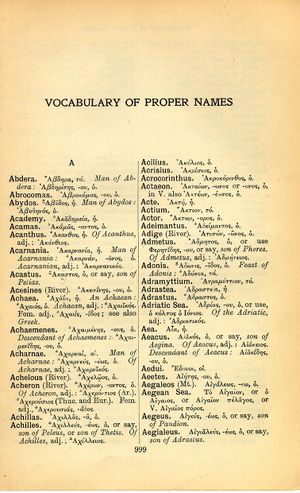Acesines: Difference between revisions
From LSJ
Εὐφήμει, ὦ ἄνθρωπε· ἁσμενέστατα μέντοι αὐτὸ ἀπέφυγον, ὥσπερ λυττῶντά τινα καὶ ἄγριον δεσπότην ἀποδράς → Hush, man, most gladly have I escaped this thing you talk of, as if I had run away from a raging and savage beast of a master
(Names) |
(6_1) |
||
| Line 1: | Line 1: | ||
{{WoodhouseENELnames | {{WoodhouseENELnames | ||
|Text=[[File:woodhouse_999.jpg|thumb|link={{filepath:woodhouse_999.jpg}}]](River) Ἀκεσίνης, -ου, ὁ. | |Text=[[File:woodhouse_999.jpg|thumb|link={{filepath:woodhouse_999.jpg}}]](River) Ἀκεσίνης, -ου, ὁ. | ||
}} | |||
{{Lewis | |||
|lshtext=<b>Ăcĕsĭnēs</b>: ae, m., = Ἀκεσίνης,<br /><b>I</b> a [[river]] in [[India]], [[which]] falls [[into]] the [[Indus]], [[now]] the Chenaub, Curt. 9, 3, 20; Mel. 3, 7, 6; Plin. 6, 20, 23 al. | |||
}} | }} | ||

